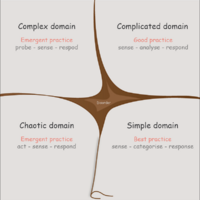The Cynefin Framework
LasseMadsen (Talk | contribs) (→The Cynefin model) |
LasseMadsen (Talk | contribs) (→The Cynefin model) |
||
| Line 20: | Line 20: | ||
'''Complicated contexts '''(known unknowns) <br> | '''Complicated contexts '''(known unknowns) <br> | ||
| + | The domain where we do not know what is going on, but we know that we can analyse what has happened and figure it out. We are sense, analyse and responds (S-A-R) | ||
| + | |||
'''Complex contexts '''(unknown unknowns) <br> | '''Complex contexts '''(unknown unknowns) <br> | ||
| + | In the complex domain we can not determine what will be the outcome, but we can run some experiments and see if they will move us in the right direction. We probe, sense and respond (P-S-R). | ||
| + | |||
'''Chaotic contexts '''(unknowable unknowns) <br> | '''Chaotic contexts '''(unknowable unknowns) <br> | ||
| + | |||
'''Disorder''' (not determined)<br> | '''Disorder''' (not determined)<br> | ||
Revision as of 14:50, 16 November 2014
This article will introduce the Cynefin framework and its underlying practices, which can be used for sense- and decision making in a complex and complicated world. [1] The framework is developed by David J. Snowden (born 1 April 1954), and is used by leaders to determine operative context so they can make appropriate choices.
The Cynefin framework splits the issues that faces leaders into five contexts; simple, complicated, complex, chaotic and disorder. Each of which requires different approaches to leadership style.
Contents |
History
The Cynefin model
Simple contexts (known knowns)
The domain of known-knowns, here we know exactly what we are doing and we have done it before, so we sense, categorize and responds (S-C-R)
- Nature:
Familiar, certain Constraints are understandable to all Understandable solutions
Complicated contexts (known unknowns)
The domain where we do not know what is going on, but we know that we can analyse what has happened and figure it out. We are sense, analyse and responds (S-A-R)
Complex contexts (unknown unknowns)
In the complex domain we can not determine what will be the outcome, but we can run some experiments and see if they will move us in the right direction. We probe, sense and respond (P-S-R).
Chaotic contexts (unknowable unknowns)
Disorder (not determined)
Examples of contexts
- Examples of simple contexts
- Examples of complicated contexts
- Examples of Complex contexts
- Examples of Chaotic contexts
- Examples of Disorder
Examples of uses
- Cynefin used in Ergonomics
Criticism
- Critical reviews of the Cynefin Framework
- Risk of oversimplifying the problems
Additional reading
- Harvard business review: Snowden, David J., and Mary E. Boone. "A leader's framework for decision making." [1]
- Cynefin 101, an article by Greg Brougham http://www.infoq.com/articles/cynefin-introduction
- The new dynamics of strategy: sense-making in a complex and complicated world http://alumni.media.mit.edu/~brooks/storybiz/kurtz.pdf
- Video: (Youtube): The Cynefin Framework http://www.youtube.com/watch?v=N7oz366X0-8
- Article archive: cognitive-edge.com http://cognitive-edge.com/library/more/articles/
- Article: 'Cynefin Centre: Life after IBM' 2005, KM World, 14, 7, pp. 1-26, Business Source Premier, EBSCOhost, viewed 14 November 2014.
- Article: Elford, W. (2012). A multi-ontology view of ergonomics: applying the Cynefin Framework to improve theory and practice. Work, 41, 812.
